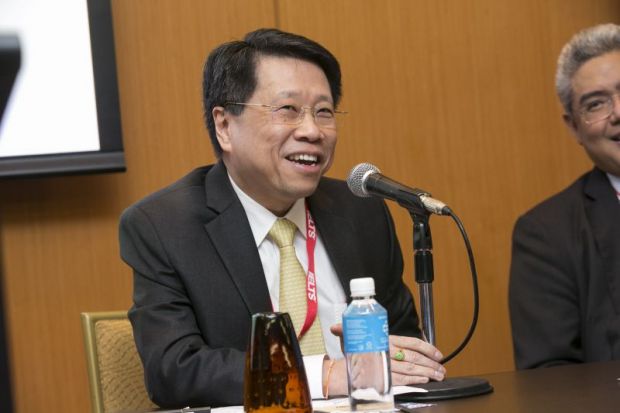Academics and universities should not be forced to prove that they help local communities, and it is better to build a consensus with governments about the best way to instil social responsibility, a minister has said.
Thailand’s minister of education, Teerakiat Jareonsettasin, was asked during the British Council’s Going Global conference whether universities should be obliged to sign up to some kind of corporate social responsibility rules.
“Then you may get bad [corporate social responsibility]. People, particularly academics, are not going to be compelled to do things,” Dr Jareonsettasin told a plenary session of the international higher education event, being held in Kuala Lumpur.
His comments came after he had also told the audience that “one thing I have learned for sure is that central planning [in higher education] doesn’t work…and I think it has been proven now internationally”. This was one reason why he had sought new laws in the country to make it possible for overseas universities to set up in Thailand.
Challenged by a member of the audience on whether this meant that existing public universities in south-east Asia should also have more freedom, he said that universities in Thailand were already autonomous and “in fact the tension is that the government sees [them] as too autonomous”.
During the session, Dr Jareonsettasin also encouraged leaders in universities and governments to be more decisive in the directions they took on policy and strategy.
“In life there will always be competing demands. In order to strike the right balance, you have to take some actions, to take some decisions,” he said.
“As a minister, I [think] that no decision is going to be completely disastrous if you can monitor it closely. But often people in leadership positions, they wait for reports…they wait on and on until they have a convincing plan.”
The same session also heard from Wim de Villiers, vice-chancellor of Stellenbosch University in South Africa.
Reflecting on the major student protests in the country that led to a change of government policy on tuition fees, he criticised the tendency to think of students as all having the same opinions.
Professor de Villiers said he was “somewhat annoyed when it was said during the protests that ‘you don’t talk to the students’.
“What does that mean? Are we referring to students as a homogeneous like-minded population. It is not that at all. It is an incredibly disparate, diverse group of interests and opinions. To refer to students as a homogeneous body is very simplistic.”
POSTSCRIPT:
Print headline: No forcing community
Register to continue
Why register?
- Registration is free and only takes a moment
- Once registered, you can read 3 articles a month
- Sign up for our newsletter
Subscribe
Or subscribe for unlimited access to:
- Unlimited access to news, views, insights & reviews
- Digital editions
- Digital access to THE’s university and college rankings analysis
Already registered or a current subscriber? Login











